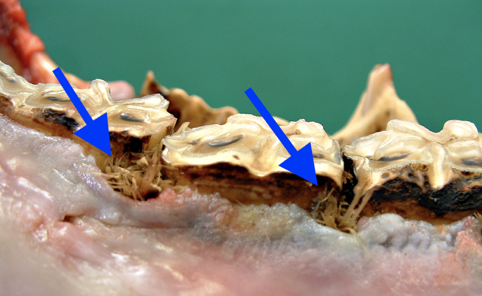Preparing veteran horses for winter: teeth, toes, tums and tetanus

Veteran horses are generally categorised as those aged over 15 or 20 years old. Approximately 40% of the UK horse population is currently in this age bracket. As a consequence of ageing, certain health issues become more common. Careful management can help us to spot them early, which is essential for the well-being of these horses.
Are you concerned about your pet? Meet a vet online!
- Included free as part of many pet insurance policies
- Help, treatment and if you need it, a referral to your local vet
- Open 24/7, 365 days a year
Vaccination status
Two vaccinations are recommended for veteran and retired horses:
- Influenza: the flu virus is able to travel up to 5km. Despite veterans being fully retired or never leaving the yard, consider other horses or visitors moving on and off your premises, or horses in neighbouring fields.
- Tetanus: the bacterium Clostridium tetani is found in soil. Clinical cases of tetanus are rare in countries where vaccines are available. Unvaccinated horses are at risk of tetanus, even having received tetanus vaccines throughout their li fe, because the level of protection naturally declines over two years. As such, booster vaccinations should be given every two years.
Parasite control
Veteran horses need to maintain a healthy condition and may have lowered immunity. However, it is not necessary to worm horses all year round. Testing and targeted treatment of worms is the best way of managing your horse’s parasite burden.
Weight: condition and nutrition
Veteran horses should be in a healthy condition before Winter starts. They require increased dietary levels of protein, energy, fibre, and vitamins and minerals. Soaked beet pulp is a highly digestible source of fibre. Older horses have reduced digestive function so it may be necessary to increase total feed intake; smaller, more frequent meals are easier to digest and maintain a steady flow of energy.
Keeping warm
It is important that older horses stay warm and dry to avoid burning unnecessary calories. Field shelters or windbreaks, together with a waterproof Winter turnout rug, are essential to avoid windchill.
Dental care
Veteran horses should have an annual dental examination and may need more regular check ups to manage specific problems. For example, below is a photograph showing two diastema (arrows) (Photo credit: Dr Matt Hanks MRCVS). A diastema is the space between two teeth; these are the spaces where humans would use dental floss to remove food. In horses, food gets trapped here and causes inflammation of the gum (gingivitis) and gum recession, and even infection and tooth loss. If necessary, diastema can be cleaned and flushed, or treated by widening the space to reduce the risk of food getting trapped. Dental pain can cause quidding and weight loss, and it is important to identify and treat diseased teeth.

Hoof care
Veteran horses need regular trimming and/or shoeing to help maintain the structure and strength of the hoof wall. Biotin can be given as a supplement to improve hoof quality.
Exercise
Arthritis is common in veteran horses. If possible, encourage at least a gentle level of exercise to maintain mobility. If ridden, allow plenty of time for warming up and cooling down for stiff joints and sore muscles to avoid injury. Your veterinarian may prescribe a low level of daily anti-inflammatory medication to maintain mobility and reduce discomfort.
Maintain an adequate health monitoring programme
An annual physical examination should be done by your veterinarian. Veteran horses are at risk of certain diseases. Here are some examples to consider:
- Blood tests can be used to screen for early indications of disease, such as liver or kidney disease.
- Cushing’s Disease (Pituitary Pars Intermedia Dysfunction, PPID): one of the most significant signs is laminitis. You may also notice increased thirst and urination, lethargy, a thick curly coat and a pot-bellied appearance. A free diagnostic blood test is available.
- Certain types of colic, including impactions, and obstructions caused by lipomas or other tumours.
- A lower immune system with or without Cushing’s disease mean that veterans may be prone to infections.
- Cataracts may cause horses to become nervous or bump into things. A veterinary examination is recommended to assess both eyes and look for other causes. A consistent environment layout, field buddy and using your voice will help them to navigate safely.
- Coughing: any cough is abnormal, whether in the stable or out exercising. Other signs to look for include nostril flare, an increased respiratory effort at rest or a heave line. They may be signs of Equine Asthma or another respiratory disease.
Still have questions?
Book a video appointment to have a chat with one of our vets.
More articles about Horse
Contact a UK vet online right now!
What can we do for your furry friend?
- Assess how they are in that exact moment
- Answer your questions, offer advice, and make a plan about your concerns
- Recommend easily available, over-the-counter pet health products when sufficient
- Make a referral to a local vet when necessary